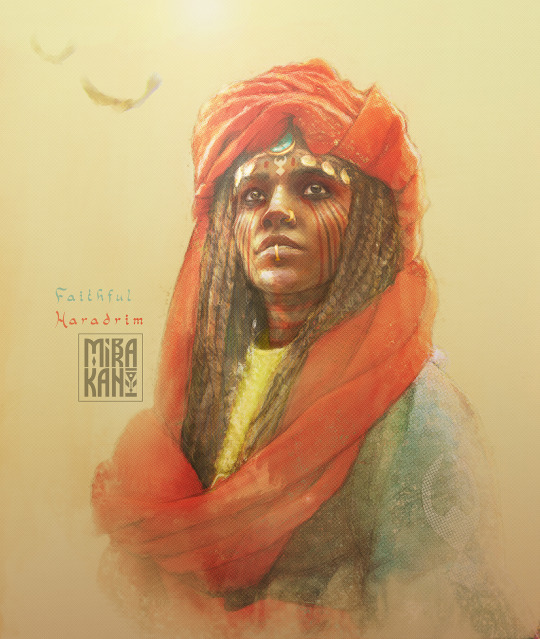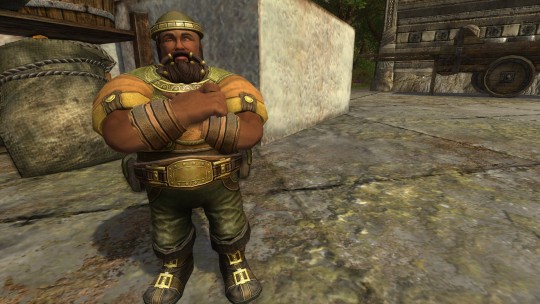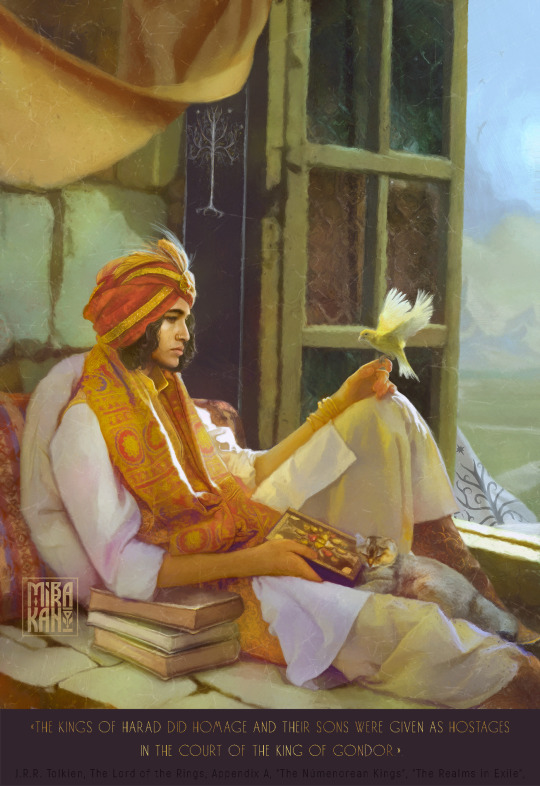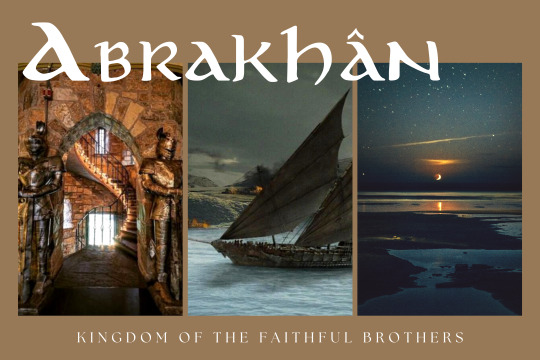#harad
Text

Faithful Haradrim portrait for a friend of mine.
I painted her as a part of the story she creates and she was kind enough to let me share it with you ^^
I think she's gorgeous and I gotta practice painting women more often.
@konartiste I tag you coz I promised 😁✅
#tolkien#lord of the rings#silmarillion#middle earth#lotr#tolkien art#haradrim#harad#tolkien fanart#artmirka#sil art#lotr art
564 notes
·
View notes
Text
Harad Through Fandom Eyes
Plenty of people acknowledge that LOTR's Haradrim, Easterlings and Variags are racist. However, I've seen less discussion about how fandom adds even more racism into the mix. This seems to be mostly because many people have very little knowledge about West Asia and North Africa, aka WANA [Why say WANA/SWANA instead of Middle East?] and what anti-WANA racism looks like.
I'm going to focus on Harad because this is the region that we know the most about. If you need a brief refresher:
Harad, or Haradwaith, is the region south of Gondor. There's a long history of violence between Harad and Gondor which dates back beyond Gondor even existed, to when Numenorians colonised Harad and repressed the people. Since then there were multiple wars and for long periods of time Gondor occupied parts of Harad. The Haradrim fight for Sauron in LoTR, partially due to their hatred of Gondor.
Harad is divided into two. Near Harad is strongly North Africa coded, and Far Harad is sub-Saharan Africa coded.

(Image description in alt text.)
Tolkien uses multiple different names to refer to the people of Harad (Haradrim, Southrons, Swertings, etc.) However, these seem to be the people of Near Harad, who he differentiates from the people of Far Harad. (There's some serious anti-blackness in this next quote, so skip over it if you need to. I only put it here as evidence that the use of Haradrim/Southrons in LOTR refers to Near Haradrim.)
[...] Easterlings with axes, and Variags of Khand, Southrons in scarlet, and out of Far Harad black men like half-trolls with white eyes and red tongues.
- Return of the King
There is more to say on this than I would be able to fit into this post. There's a discussion to be had about Tolkien's textual and real life relationship with Black people. There's also a discussion that needs to be had about how Tolkien's racism is often excused with the idea that he was a 'benevolent' or well-meaning racist, a product of his time. It's an excuse that ignores the violence of quotations like this and the way that he wielded his whiteness against Black people in academia and writing.
I don't have time or space for those discussions in this post, but I want to acknowledge them.
What I want to discuss here is fandom portrayals of Haradrim. I'm not going to talk too much about the in-text racism, because that has been extensively covered elsewhere. But in summary:
The idea of the good white guys conquering the lesser brown 'Men of Darkness' is inherently racist
Tolkien's description of the Haradrim, such as repeatedly describing them as a cruel and warlike people, is also racist
The one paragraph where Samwise feels empathy for a dead Haradrim soldier does not lessen the racism.
With that out of the way, let's talk about fandom.
There's a gaping void in the information we're given about the Haradrim, so of course fandom attempts to fill the gaps. Fans often take inspiration from WANA. But many fans don't actually know that much about WANA and don't realise how much of their perception of it is based on racist and imperialist propaganda.
In fannish depictions, Harad all too frequently becomes an exotified fantasy that pulls from Western perceptions of WANA. Orientalist ideals of a mystical, magical, and yet dangerous place predominate the fannish idea of Harad.
The first thing that you should know about WANA is that it's an extremely culturally, religiously and geographically diverse place. If your depiction of Harad is entirely desert, or made of a culturally homogenous people with a narrow range of skin tones and features, you need to expand that. Equally, depictions of Harad as more 'socially backward' than other areas of Middle Earth stem directly from racist propaganda.
Too many stories write Harad as misogynistic and homophobic, often in direct contrast to other areas of Middle Earth. As many WANA people have pointed out, these kinds of sweeping generalisations are often specifically targeted at WANA because of racism.
Mysterious cursed objects from the 'far away lands of Harad', decadent sultans, the fetishization of cultural practices like belly dancing; these are all forms of Orientalism. Female characters may be sexualised, shown as seductresses or members of harems. (By the way, Westerners tend to have a very incorrect understanding of what harems actually are/were. They were the part of a Muslim household reserved for women and pre-pubescent boys. It was outsiders who perceived them as fundamentally sexual spaces and created the modern tropes of sexual harems.)
Male characters may be violent, cunning, greedy, dangerous and strange. There may be public executions and enslaved peoples, regardless of the complete absence of a textual basis. All of these things stem directly from racist ideas of WANA as 'barbaric' and 'uncivilised'.
In fact, Haradrim were once enslaved by Numenorians. They were victims of violent colonisation that continued into the days of Gondor. They have every reason to hate the 'Men of the West' and fight against them.
On a final note, the most major and dangerous WANA stereotype is the portrayal of WANA people as terrorists. This isn't a trope seen in Tolkien's works because it's primarily a post-911 phenomenon. But it's something that you must be conscious of if you're writing about Harad or other WANA-coded regions.
174 notes
·
View notes
Text
"Harad" in the Third Age having insanely complex politics and factions... People willingly fighting on Sauron's side. People forcibly conscripted to fight on Sauron's side. People fighting against Sauron (and their own neighbours in the process). Legitimate armies resisting him, and rebel cells consisting of twenty youths with ten swords between them.
Some of the people allied with Sauron are simply evil, and others have longstanding beef with Gondor, and sometimes it's being colonized by Gondor proper, and other times it's the memory of Númenor -- who in fact acquired most of that enemity in its years of being in practice led by Sauron. Some knowing who they're ultimately allied with, others having been recruited by less scary intermediaries. And it's just such a mess.
#I write Harad in quote marks as part of my#there's no way that's the actual name#agenda -- because it feels a bit ridiculous to group such a huge number of peoples simply into the 'South'#my post#tolkien#Harad#lotr#peoples of arda#haradrim
20 notes
·
View notes
Photo

486 notes
·
View notes
Text
I love that I'll go look on the One Wiki To Rule Them All to look at the pages for Easterlings and Southrons as if they've changed at all in the last 20 years.
Like Tolkien is gonna come back from the dead and be like: "Gurrrllll new khand lore just dropped".
#khand#harad#rhun#umbar#corsairs of umbar#haradrim#easterlings#variags#balcoth#wainriders#sauron#mairon#nazgul#angbang#lord of the rings#tolkien#lotr#the hobbit#not me building a time machine#to make the professor write a book abt Alatar & Pallando
67 notes
·
View notes
Text

A watercolour painting of my version of the landscape of the Harad, baking under the intense sun.
35 notes
·
View notes
Text
Tûl Harar WIP: Arrival of the Blue Istari
Just a WIP I am working on involving Manó and Aratacáno, and a few of my other OC's. Princess Fisrah of Tûl Harad, a city in Far Harad, helps her father in the welcoming of two strangers.
From high atop her throne that sat just to the left of her father’s even more grandiose one, Princess Fisrah watched the two men approach. They seemed to be a duo of peasant merchants, with their plain clothing and walking sticks, and the princess sniffed at them in contempt. The princess placed her decorated hands demurely in her lap as she only half-listened to the proceedings. Rings and gems glittered and made a gentle tinkling sound as she made the slightest movement. Sumptuous silk made a soft hissing with the adjusting of an arm or the crossing of a leg. A long, dark braid decorated with expensive baubles sat over a slender shoulder.
Normally, it was her brother Hadhokor who would take part in these sorts of things, him being the first born male by their father. But he was away now, fighting in some skirmish. But her father had seen fit to have Fisrah sit in Hadhokor’s place, telling the princess to take leave of her ladies and their gossiping.
“Strangers from the North,” she heard her father, the Lord Azhab, say with a sneer and a wave of a hand. “Why should I welcome you? Do you wish to bring the Elvish war upon us all? Don’t think that we are deaf to the rumors here in my court. There may be a huge distance between our lands, but word travels fast, especially in the caravans. My people have no need for more wars or for shedding blood. They’ve seen enough of that already.”
One of the two “merchants” stepped forward, the taller of the pair, a reddish tint coloring the silvery locks (his looks almost attractive, even, in Fisrah’s opinion), and he spoke, bowing politely to those assembled:
”You couldn’t be farther from the truth, your eminence. We are but humble tradesmen, my friend and I. We wish no trouble on your citizenry”
Fisrah took note of how her father analyzed the man’s words, his eyes cold and shrewd, sitting forward in his chair and rubbing his bearded chin in thought:
“I see. But how do in know that you’re just not trying to trick me with your silver tongue? And your silent friend. What has he to say about all of this? Or have you instead come to my city to kill me and steal my authority?”
The other man’s head popped up then, and Fisrah could almost believe that she saw a flash of anger there on the ageless Elven features. Though the two seemed to be old men clutching tightly to walking sticks, there was something to them that she could not name. She had never seen one of the Elven folk before, only heard the tales, but Fisrah supposed that this is what they must look like.
Who are these men who claim themselves mere merchants?
”Shall I have my guards search you and throw you into the dungeons to let your flesh be torn apart by my tigers for speaking such treasons?”
Flinching at the image conjured up in her mind, Fisrah idly pushed it from her head. She had better things to consider, places to be, other than such horrid and unnecessarily bloody events. How she detested talk like that!
Tension hung in the air then, staring daggers, neither saying anything to the other.
It was then, that the princess shifted in her seat, moving gracefully to whisper in her father’s ear in a sweetened tone:
”Father, these men are tired, having clearly traveled from afar. Perhaps we might offer some food and shelter? It is obvious they mean no harm.”
Letting out a huff, the Lord Azhab finally sat back, his arms across his chest. It seemed to her that he did take heed of her words, thinking them over before giving his reply to the two men.
”I’ve heard quite enough from you.” Lord Azhab spat, “Not enough from your friend however. I shall like to hear what he has to say as well. I command it.”
Giving another small bow, the man moved aside, giving room to the other stranger. The princess saw how the silent one slowly hobbled forward, his gaze stern and unyielding as that of his fellow merchant (if that was what they truly were). It was like staring straight into the gaze of the Great Judge himself, having one’s very soul on display.
The princess could not suppress the shiver that slid up the length of her spine, swallowing hard. It was far from a cold day, and yet it felt like an icy wind blew right through the room.
A group of armed soldiers stepped up, hands on their swords and ready to defend their lord. As if mesmerized, Lord Azhab waved them to step back.
What threat is an old and feeble man, in anycase?
Opening his hands in a friendly gesture, the silent one did finally speak:
”My good and mighty Lord of Tûl Harar, we two are bringers of peace. That is all. We bring no weapons or any enemies trailing behind after us. Nor do we have any dubious connections with the Northern forces from Gondor or otherwise. Let us go free, and we will trouble you no more.”
The man’s words took hold of them then, grabbing their attention and not letting go. Even Fisrah tried to fight it, but in the end had to relent to whatever spell was woven by this strange man who wasn’t just a man. And suddenly, the pair became tall and majestic as any king surrounded by subjects, ready to put out a hand and speak an order to them.
“You…what power do you have that gives you the right to speak to me like that??” Azhab said, standing from his seat, hands clenched at his sides.
A hush filled the room, as there was no response. Fisrah brought a hand to her mouth, letting out a soft gasp.
Yes, that was what they were. Spies. They obviously wanted to steal the wealth from her father and cast them out onto the street.
“Spies, then. That is what you are. Spies, and snoops.”
Turning, the lord quietly spoke to a man to stood off to the side, head lowered in respect. When Azhab turned back, he sneered:
“We will show you how we deal with spies, in Tûl Harar.”
#tolkien#silmarillion#blue istari#istari#manó#aratacáno#Maiar of mandos#harad#far harad#tolkien oc#silmarillion oc#tolkien fanfiction#silm fanfic#silmarillion fanfiction#silm#ainur
11 notes
·
View notes
Text


I love the Temámir so much.
I"m not 100% which Tolkien clan they're supposed to be, but they're a different clan from Gimli that lives *vaguely* South.
Potentially in Harad?
They're very Byzantine.
19 notes
·
View notes
Text

Anthony Fineran, Harad Salt, 2024
5 notes
·
View notes
Text
Life is Strange/Lord of the Rings crossover fanfic. Basically Max and Chloe go to Middle-Earth and back again.
While this crossover might seem eclectic, I think there are some common themes between LiS and LotR. Ordinary people faced with impossible situations. The power of love and friendship allowing people to endure untold hardships. Destiny and what should people do when confronted with it. "The smallest person changing the course of the future".
If you don't like crossovers in general or fantasy in particular, consider reading the beginning of chapter one and the entire chapter four, which take place before Max and Chloe leave their universe and after they come back respectively. That way it becomes a short story about Max's and Chloe's visit to Away. But then you'd miss the part where I describe how Max's and Chloe's engagement rings look like (how could I write a crossover with the Lord of the RINGS and not touch upon this subject), as well as one particularly sappy and drawn-out declaration of love made by Chloe before they go into battle.
If you think that David doesn't deserve Chloe's forgiveness for his "tough love", my answer is - nobody ever deserves forgiveness. It's always something better than we deserve. I think Chloe is a kind-hearted person. She was able to almost immediately forgive Max. I imagine she would also forgive David. And I find the prospect of Chloe and David being reconciled much more appealing than Chloe hating him for the rest of her life, even if she has legitimate reasons for doing so.
While my nickname on AO3 might suggest I hold extremely unorthodox views on Middle-Earth, I honestly don't think what I wrote is incompatible with what we know about the world of LotR. I don't think what I wrote is a complete retelling, like "the Last Ringbearer". In my mind, I just provided a different perspective on the events we already knew about.
The belief that death is a divine gift and rejecting it is wrong, which is held by the "good guys" of LotR, allowed for some nice contrast and conflict with Max's life philosophy, which seems to be all about saving people who are "destined" to die, like Chloe and Tristan.
#Max Caulfield#Chloe Price#Pricefield#David Madsen#Life is Strange fanfiction#LiS#Life is Strange#crossover#Lord of the Rings#Orcs#Uruks#Alatar#Pallando#Blue Wizards#Elves#LotR#Harad#Haradrim#Khand#Variags
14 notes
·
View notes
Text
Sauron as the God King of Middle-earth
I don't think many people consider exactly HOW Sauron came to have such sway over the people of the South and East in the Second and Third Ages. So many people think of him as an evil overlord, who is either ruling over nations of wicked people who have sold their souls to him (both figuratively and literally speaking), or oppressed peoples forced into slavery to a tyrannical master.
However, Sauron is not ruling any of these countries. It is not a case of a nation with superior manpower and/or technology taking over weaker nations and subjugating them. Sauron is one maia who resides in a country slightly larger than Turkey, the northern half of which becomes an inhospitable wasteland whenever Mount Doom erupts for an extended duration of time. The fertile land of Nurn can support a sizable human population, but I do not think that a large enough force could be rallied from the populace to create armies powerful enough to subjugate the peoples of Harad, Khand, and Rhun, while simultaneously assailing the West and protecting Mordor from counter-attacks from all directions.
No, Sauron is not using brute force to intimidate the peoples of the South and East into following him.
He is using religion.
The people of Harad, Khand, and Rhun ally themselves with Mordor because they worship Sauron as a god, not because they are intimidated by his military might. Yes, they fear him, but it is the fear and awestruck reverence with which one regards a deity.
The nations and tribes of the South and East send wagon trains of goods and slaves to Mordor, not as tribute, but as grim tithes to the dark deity whom they worship.
Without his Southern and Eastern allies, Sauron only has orcs and trolls to command, and while they are certainly intimidating, there are not enough of them to subjugate the entirety of the South and East. Plus, orcs and trolls are sensitive to sunlight, which puts them at a disadvantage to humans.
So Sauron's true power comes from the worship of his followers, and not from military might.
I think many times fans regard Sauron as a human dictator. However, human dictators usually come to power by becoming the leaders of countries that already have significant political influence and military strength.
Sauron literally has nothing but himself.
And that is enough, since he is a god, and by nature people want to worship him.
This is why truly defeating Sauron would be so difficult.
Because while individual humans may have a change of ideology and turn away from their original faiths, as a whole humanity prefers to continue worshiping the same deities that their ancestors worshiped.
Kings and warlords may rule for a time, but gods are eternal.
19 notes
·
View notes
Text

In the 1050 of the Third Age Gondor was at the height of its power and "defeated the Men of the Harad, and their kings were compelled to acknowledge the overlordship of Gondor…the kings of the Harad did homage to Gondor, and their sons lived as hostages in the court of its King."
RotK, Appendix A, I, iv, Gondor and the Heirs of Anarion
✔ Close-up of Haradrim Prince -> click here
#silmarillion#tolkien#tolkien art#artmirka#lord of the rings#lotr#middle earth#haradrim#tolkien fanart#fantasy art#harad#gondor#lotr art#silm art#NO AI!!!!#no ai art
1K notes
·
View notes
Photo



@secondageweek day five | worldbuilding | the origins of umbar
It was in this time that the Men of the West arrived, naming the land Harad and staking claim over its coasts. Initially the strange, tall Men with elven voices shared their knowledge with the Haradrim, the two cultures exchanging goods and information, and even helping the mariner-king Tar-Aldarion when he encountered troubles in his voyages. The kings of the seaside nation Rûvashû allowed these Númenóreans to establish the haven of Umbar within their borders, and for some years there was peace between the Men of the South and those of the West.
Yet as the centuries passed, the Númenórean mariners grew hard-hearted and cruel. The fearsome Tar-Círyatan made forays from Umbar into Rûvashû and its surrounding territories, conquering those lands and demanding goods, wealth, and slaves. Word spread quickly to the inland kingdoms of the Westerlings’ cruelty, and many turned to the old legends of Sar-Myrin’s power and dominance, and above all his hatred of the West and its inhabitants.
When Sar-Myrin [Sauron] at last returned, he carried with him many Rings of Power, which he granted to the chiefest of his mortal servants: Vekmû, the vizier of Rûvashû, and Sarnūsh, the queen of Yettafaz. With these Rings they became fierce and powerful magicians known as Nazgûl, instilling terror upon their subjects and bending them to Sar-Myrin’s will. Sarnūsh earned the title of High Sorcerer as she learned the dark art of necromancy from her Master, binding wraiths to her service and raising the dead to fight and die again in her endless wars, while Vekmû used his newfound power to rally all the might of a thousand leagues about Rûvashû to free them from Númenórean control, pushing their enemies back to their haven of Umbar, his plunderings so violent his own soldiers named him the Forsaken Reaver.
[...] But the weakening of the Nazgûl’s power also allowed for the Númenóreans to return in force, expanding Umbar and founding the inland kingdom of Abrakhân. Before long, the arrogant king Ar-Pharazôn arrived in all his golden glory to demand the surrender of Sar-Myrin himself, and to the astonishment of all Rûvashû he humbled himself and submitted to Pharazôn’s shackles, sailing away with him back to Númenor.
In Sar-Myrin’s absence the Nazgûl only increased their cruelty, and it seemed that they and the Númenórean settlers began to work together to torment the people of the South. The brother-kings of Abrakhân, Herumor and Fuinur, built great temples to Sar-Myrin, enslaving the Haradrim and sacrificing any who protested their rule on their fiery altars...
—Men of Middle-earth: Haradrim
#secondageweek#tolkienedit#oneringnet#silmedit#silm#silmarillion#umbar#harad#haradrim#abrakhan#ruvashu#numenoreans#my edit#headcanons#tefain nin#the text here is repurposed from another edit (linked) i made like. a year ago lol#it's written from the pov of the haradrim bc we get too much from the numenorean pov in canon :p
50 notes
·
View notes
Text
The peoples of the South and East
A companion post to my fic that change not with the changing of the years
Ok, so "Harad" just means "South" and it's definitely not an actual name the people living there have for themselves, just a catch-all phrase for anything south of Umbar as used by everyone north of Umbar. And it cannot be a single country. That said, the following is 100% pure and unadulterated headcanon, and none of the names here, except that of Khand come from anywhere within Tolkien's works.
There is a lot of city-states, mostly because they're easier to invent, haha, but Selih on the edge of the desert, and the Bay of Kenteh, lie inside countries of their own. Sarakhir, Verna and Ekithmar are city-states proper.
The people of the river Verid are a curious case, because aside from a city-state or two, there is no unifying power governing them. They are tribesmen and village folk; fishermen, farmers and herdsmen most of them; sharing much of a common culture (though they are an amalgam of several peoples), but forming no political state. They are reasonably well-off for country folk, and they hold the current arrangement optimal -- unless they are currently being invaded, in which case it really doesn't help. By the War of the Ring, a fair bit of the region is under the power of Sauron with many of the youth brainwashed into supporting the army they have been conscripted into, and an important fiercely rebelling undercurrent.
Zûnar lies near enough to the Verid, though not, itself, beside it, and is in fact the westernmost region of a small kingdom, rather than a principality itself. It might have some Númenorean influence -- yes, I'm mostly thinking of that because I spelt the word with the Adunaic-typical weird triangular accent -- so the kingdom likely has access to the sea.
I have imagined Evralthum and Mridyanva to have some Indian influence, although I'm not 100% sure on it yet. Evralthum, as mentioned in the fic, has been forcibly swallowed up by Mridyanva, however it will become a country again in the general upheaval following the War of the Ring. Mridyanva itself might support Sauron's army to an extent, but possibly through an intermediary empire pressuring it, rather than of itself.
Milyan-kai definitely has some East-Asian influences, probably Japanese rather than Chinese. I'm on the fence regarding Ta-L'nau, and Olonde is something of a "typical fantasy kingdom minus the medieval England/Germany thing". They're too far off to be influenced by Sauron, although they might be fighting his armies on their fronts.
Khand is probably one of the human kingdoms closest allied with Sauron; not the only one, but the best known. I haven't named any others yet. There's also the Corsairs of Umbar who are universally hated by everyone in the region, because corsairs.
6 notes
·
View notes
Text

Story link: What Your Life Is by @starspray (AO3)
Art link: Storm Season by @independence1776 (SWG)
Ratings: Fic is rated Teens; art is rated General.
Warnings: None
Relationships: Maglor & Huan, Maglor & Original Characters, Maglor & Elladan & Elrohir
Characters: Maglor, Huan, Elladan, Elrohir, Original Characters
Word count: 20,000
Additional Tags: Post-Canon, Harad, Cult of Melkor, Fourth Age, Friendship, Found Family
Summary: "Surely not." At the sound of his voice the great shaggy shape stirred, and turned its head. [...] He fell to his knees in the wet sand, staring into eyes that gleamed with ancient Treelight and even older starlight. Then his face was being licked clean of tears by a giant tongue, and he was both laughing and crying as he flung his arms around the dog's shoulders, burying his face in wet fur, hardly caring that it was still crusted with sand that scraped against his cheeks. "Huan, what are you doing here?"
The art and fic were created for @tolkienrsb 2022. (The fic link will go live on September 10.)
#trsb 2022#trsb22#maglor#huan#elladan#elrohir#original characters#harad#silmarillion#lord of the rings#tolkien#starspray#independence1776#(oc's name was triggering the shadowban which is why the summary is now what it is)
59 notes
·
View notes
Photo

Harad - Huesca Province, Spain
129 notes
·
View notes